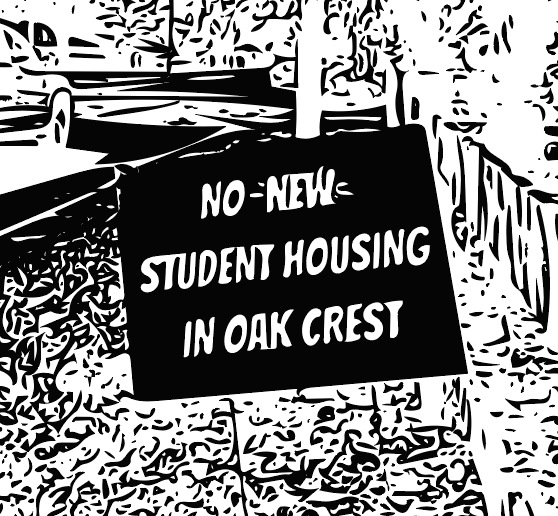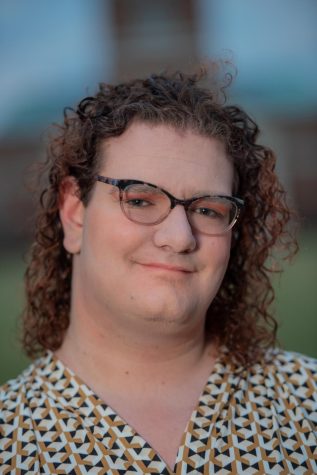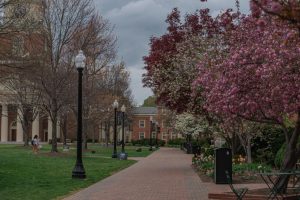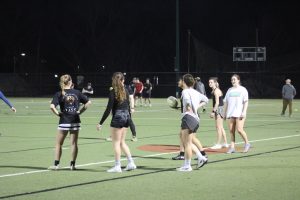Wake Forest students are advised to be more respectful to their neighbors
Residents of the Oak Crest neighborhood have raised complaints about student behavior

Signs advocating against student housing do not target students, but developers, writes Professor Dean Franco.
September 21, 2022
Community members in neighborhoods around Wake Forest University have become frustrated with what they view as inconsiderate behavior from some off-campus Wake Forest students. According to Wake Forest’s Associate Dean of Student Conduct, Dr. Jim Settle, there’s been ongoing and increasing reports of off-campus student behavior.
“The neighbors who live in areas where there is a mix of students and non-students report ongoing, and increasing, concerns with the behaviors and actions of students,” Settle said.
“Large social events, trash from guests, parking issues (blocked driveways, blocked roads, parking on lawns), and other disturbances caused by students are being noticed and reported more frequently by neighbors.”
Residence Life and Housing policies allow students to live off-campus their senior year — or earlier if a student successfully petitions for an exemption. However, students must still follow most university conduct policies. Neighborhoods around Wake Forest however feel frustrated by some off-campus students’ conduct and behavior.
This frustration has spurred action. Over the summer, multiple signs popped up on Polo Road, reading “no new student housing in Oak Crest”, the historic neighborhood that surrounds Wake Forest’s campus to the north. The Winston-Salem Journal, in an Aug. 30 article, reported that those who live in the neighborhood are concerned about further outsourcing and development by Wake Forest. The article noted that among residents’ concerns is the frequency of disruptive parties. Among those quoted was Dave Stith, president of the Oak Crest Neighborhood Association.
“If you drive around the other end of Polo Road across University, you’ll see what we mean,” Stith told the Journal. “Wake Forest has been responsive helping with concerns about students and partying. But the city so far has been telling us there’s not much that can be done.”
The city has seemed to take some action in the form of police enforcement of noise violations. According to Assistant Dean of Fraternity and Sorority Life Betsy Adams, Winston-Salem Police are, in some cases, skipping noise complaint warnings and going straight to citations.
“The conversations I’ve been having with [Associate Dean of Student Conduct Dr.] Jim Settle is that there’s a lot of frustration in the neighborhoods about noise, trash and just feeling like our students are not doing a good job of living in community with their Winston-Salem neighbors,” Adams said.
The Journal also reported that “earlier this year, [the Winston-Salem City] Council, with an eye toward adding affordable housing, approved an ordinance that allows property owners to build ‘accessory dwelling units’ on any residential property as long as they meet certain guidelines.” This ADU (accessory dwelling unit) ordinance concerns Oak Crest citizens regarding which additional accessory dwelling units (some for student housing) might further impact their neighborhoods, life and property value.
Matthew Clifford, dean of Residence Life and Housing at Wake Forest, said that Wake Forest’s policies would not change as a result of the Journal’s reporting. He did, however, note that Wake Forest’s off-campus students must undergo education to “be a good neighbor” and live in community with non-student neighbors. Per Clifford, in the early 2000s, Wake Forest initiated a partnership with multiple community stakeholders, including residents, Winston-Salem police and university officials called the University Area Community (UAC).
“Frequently, we will hear the concerns that are brought up and help to mitigate those in many ways, but one of those ways is through education,” Clifford said. “So if a concern is brought to us about trash, then we try to put some educational effort into reminding our off-campus students what it’s like to be a good neighbor. And living in a community with our permanent residents…. part of being a good neighbor might be that you put your trash in the proper container, putting it up by the street when it’s trash day and then bringing it back when the trash is collected.”
Off-campus parties remain a major contention between students and non-student community members, some of which are hosted by Wake Forest’s fraternities. Adams noted that she met with all chapter presidents earlier this year to provide them with educational resources.
“We need to have conversations on what it means to be living in a neighborhood,” Adams said. “[We need to talk about] how we [can build] better relationships and recogniz[e] that perhaps blaring music with a bunch of curse words when kids are walking by with their parents and dogs is something that needs to be thought through a bit more.”
Clifford advised neighbors with immediate concerns regarding a student or student behavior at a particular property to get Winston-Salem police involved.
“We certainly encourage mutuality between neighbors or permanent residents and students so much in the same way that you know, if you live on campus, we encourage students to resolve any concerns between each other,” Clifford said. “But if they or a student need additional intervention…a great resource for our neighbors and students alike is the Winston-Salem police.”
The university is notified of any WSPD interaction between students off-campus. If the behavior arises to a conduct violation, then it is handled within the conduct process. Conduct processes are the same for off-campus and on-campus students and are based on Wake Forest’s Honor Code System which includes that “we willingly accept responsibility for our own conduct and activities.” Settle provided the Old Gold & Black with a brief overview of the conduct process.
“We resolve nearly all of our conduct allegations through informal resolution — an agreement-based process where the Conduct Officer and the student come to an agreement on responsibility and outcomes (if there are any),” Settle said.
Settle continued: “In situations where the Conduct Officer and student cannot reach an agreement, the formal resolution process occurs, where the Conduct Officer may make a decision or may facilitate a conduct meeting with a panel of faculty, staff and student members to review the allegations, determine findings and propose outcomes (if necessary). In either instance, the student alleged to have violated parts of the Code of Conduct can work closely with a Student Conduct Adviser.”
Additionally, Residence Life and Housing maintains a record of all off-campus students, including the names of landlords. Under Winston-Salem’s RS-9 (Residential Single Family) ordinance, only four students may occupy a rental property. If a neighbor complains about a student or specific property, then Residence Life reaches out to the students on the specific lease in which the instance or complaint took place.
“If a complaint comes to us, then we would typically reach out to the student and the students on the lease and express the complaint and really work with them on different strategies to mitigate that and prevent a similar complaint from emerging in the future,” Clifford said.
Ultimately, though, the administration’s desire is not to punish students, but to help them learn to live alongside their neighbors.
“Our desire is to help our students be good neighbors,” Clifford said. “Really, we just want our students who live on campus to be good neighbors with each other if they live in Magnolia, or Bostwick or Deacon Place, we want our students to be good neighbors, when they are living on Polo Road or Charlton Farms or so on and so forth.”















Ja'Maul Redmond • Oct 12, 2022 at 2:30 pm
This is about the second or third article I’ve read about the problems with student housing, from a variety of sources. All of them mention the concerns from residents and list the actions taken by the university. But none of the articles mention the developer’s names, much less their responsibility on the issue. The true problem is the development, not the students within the development. When you build student housing that equal to greater than 25% of the existing houses in a neighborhood you automatically change the fabric of the neighborhood regardless of whether those students are good neighbors or not. The new student rental homes by nature have more residences, more turnover, and more cars at a minimum. In addition, when you dig deeper you find that student housing changes foot and automobile traffic, delivery and utility services. New student housing developments are completely different than student room rentals or even existing in-fill student rentals. These are a large number of homes that are built for that reason only and when it’s done poorly it’s no better than building a brand new dorm inside of a residential neighborhood. The perceptions of a neighborhood changes when that building type is implemented. For example, the students actions change when they know for a fact that all of the houses on their street or block are students houses. When that happens, parties, noise, and trash incidents increase. All of these issues can be addressed proactively and successfully by the developers before they build. The big question is whether they will do that or will they leave the residual problems to be answered by the university and residences once they are done?
Adrienne Pilon • Sep 27, 2022 at 5:03 pm
Unfortunately, the reporters here missed the point of these signs. A parcel of land in this neighborhood has been purchased by a development company, run by people who are not residents. These are the same developers who built the hideous student housing on Polo Road. The land being threatened is a beautiful oak forest, land that is an integral part of this historic neighborhood. The wording of the signs may be misleading, but it’s important for journalists to get the story straight–the neighbors have nothing against the students. It’s the developers we don’t want.
Lynn Byrd • Oct 9, 2022 at 11:42 am
I second Adrienne’s comment.